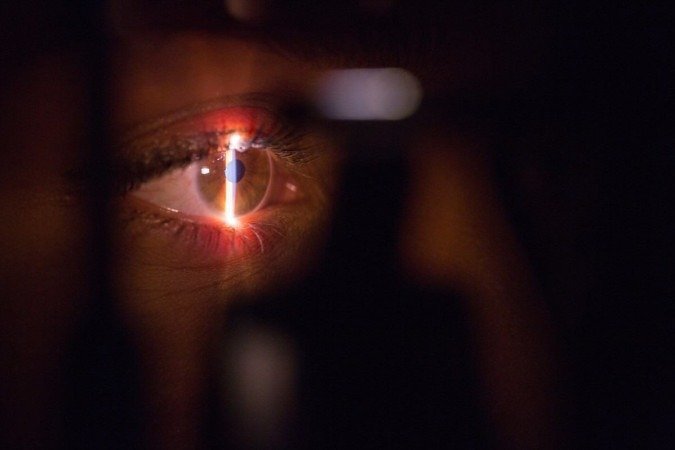Posted on 05/26/2022 15:11
(Credit: Unsplash / Disclosure)
This Thursday (26/5) is celebrated as the National Day to Combat Glaucoma, a silent and incurable disease whose early detection allows it to be controlled using resources that prevent its progression and consequent vision loss. The date was created with the aim of raising awareness and alerting about this disease, which affects approximately 2% of the Brazilian population. There are many people who are unaware that they have the disease and many conditions that can be avoided.
a mail Speak with ophthalmologist Ricardo Yogi Abe, responsible for the glaucoma sector at Oftalmológico de Brasília (HOB), who explained a little about the disease and answered some questions. He explains that glaucoma is an eye condition that affects the optic nerve, and its integrity is essential to maintaining the quality of vision. “The deterioration of the optic nerve leads to a gradual loss of vision. Usually people associate the disease with high intraocular pressure, but this is one of the factors. Since this condition, over a few years, damages the nerve fibers in the optic nerve “, details the specialist.
“The eye contains fluid (aqueous humor), which circulates within it constantly. Intraocular pressure is regulated by the balance between the production and flow of fluid in the anterior chamber of the eye. In glaucoma, there is a decrease in the flow of this fluid, causing it to accumulate inside the eye, causing It leads to an increase in intraocular pressure. See answers to other frequently asked questions about the disease:
What are the symptoms of glaucoma? Can it be diagnosed in a routine consultation?
In its most common form, the so-called open angle glaucoma, which affects 80% of people, the disease develops silently, that is, it does not burn, is painless, does not itch or irritate. The patient only notices something wrong in the advanced stages, when little or nothing else can be done to save the already affected vision. The only way to detect glaucoma is with tests that analyze the integrity of the optic nerve. In the clinic, the ophthalmologist measures intraocular pressure and examines the fundus and field of vision when necessary to check if there is any damage.
Is glaucoma curable?
There is no cure for glaucoma. It is a chronic disease, i.e. the patient has to use appropriate medications throughout his life to control it or stop its progression. Without treatment, a person begins to lose peripheral vision, that is, although he can see perfectly when looking ahead, he does not clearly see objects to the sides. In the more advanced stages, central vision is also affected and glaucoma can progress to blindness.
How do you prevent?
According to data from the World Health Organization (WHO), glaucoma is the largest cause of irreversible blindness in the world, and it is estimated that by 2040, more than 111 million people will have this diagnosis. In Brazil, the disease affects more than 900,000 people, according to the Ministry of Health. The sad thing is that most cases of blindness can be avoided, and it is sufficient to have regular check-ups with an ophthalmologist to catch the problem early and get the appropriate treatment to maintain the integrity of vision.
What is the ideal treatment for glaucoma?
Medications such as eye drops, laser application, or surgical procedures. It will depend on the ophthalmologist’s recommendation that accompanies each case. These treatments will mainly help reduce intraocular pressure, which is one of the biggest risk factors for developing glaucoma, although the disease can also occur without intraocular hypertension, as it can be congenital, due to the use of corticosteroids or even secondary to some surgery. However, keeping intraocular pressure regulated is very important.
What are the disadvantages of not following the treatment properly?
Gradual irreversible loss of vision, up to complete blindness.
Is there surgery for glaucoma? If yes, what is the success rate?
Recently, I was at the head of a large, multicenter study conducted across Brazil, coordinated here at Oftalmológico de Brasília Hospital, which had encouraging results, treating 835 eyes with selective laser trabeculoplasty (SLT). Of all the participants, 88% were either able to maintain their target eye pressure without using eye drops. or have had low intraocular pressure; Or, however, they reduced the number of eye drops they needed per day. This is the first large-scale study in Latin America that collected a large number of Brazilian patients and reinforces previous work on the efficacy of using SLT for patients with ocular hypertension or patients with open-angle glaucoma. The study was published in the international journal Scientific Reports Give temper naturenow in April.
Who is in the glaucoma risk group?
People over the age of 40 with a family history, people of African or Asian descent, individuals who have experienced physical injury to the eye, those who use corticosteroid medications excessively and other medical conditions.
What advice would you give someone with glaucoma?
In addition to a balanced diet and physical activity, it is necessary to regularly consult your ophthalmologist, because only he will be able to detect any sign of anomalies. In the case of glaucoma, prevention is what guarantees the patient’s quality of life.
in DF
The National Congress building is lit green from May 21-24 and May 26-31, in support of the 24 Hours of Glaucoma Campaign and National Glaucoma Day.

“Hardcore beer fanatic. Falls down a lot. Professional coffee fan. Music ninja.”


![[VÍDEO] Elton John’s final show in the UK has the crowd moving](https://www.tupi.fm/wp-content/uploads/2023/06/Elton-John-1-690x600.jpg)




More Stories
The Director of Ibict receives the Coordinator of CESU-PI – Brazilian Institute for Information in Science and Technology
A doctor who spreads fake news about breast cancer is registered with the CRM of Minas
The program offers scholarships to women in the field of science and technology